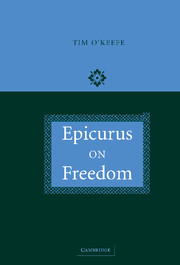Book contents
- Frontmatter
- Contents
- Acknowledgments
- List of abbreviations
- Introduction
- Chapter 1 What sort of an incompatibilist is Epicurus?
- Chapter 2 Lucretius on the swerve and voluntas
- Chapter 3 Aristotle and Epicurus on the origins of character and action
- Chapter 4 Epicurus' reductionist response to Democritean fatalism
- Chapter 5 The swerve and collisions
- Chapter 6 The swerve and fate
- Chapter 7 Epilogue: Epicurus and the invention of libertarian free will
- Appendix: Some texts
- References
- Index
Chapter 4 - Epicurus' reductionist response to Democritean fatalism
Published online by Cambridge University Press: 22 September 2009
- Frontmatter
- Contents
- Acknowledgments
- List of abbreviations
- Introduction
- Chapter 1 What sort of an incompatibilist is Epicurus?
- Chapter 2 Lucretius on the swerve and voluntas
- Chapter 3 Aristotle and Epicurus on the origins of character and action
- Chapter 4 Epicurus' reductionist response to Democritean fatalism
- Chapter 5 The swerve and collisions
- Chapter 6 The swerve and fate
- Chapter 7 Epilogue: Epicurus and the invention of libertarian free will
- Appendix: Some texts
- References
- Index
Summary
Other than Aristotle, Democritus is most often cited as the person Epicurus is responding to when formulating his position on freedom. Surely this is correct. For the most part, Epicurus appropriates his atomist metaphysics from Democritus. However, the swerve is one of his major modifications to Democritus. The Epicurean Diogenes of Oinoanda writes that Epicurus ‘discovered’ the swerve, an atomic motion that Democritus did not discern, because Democritus failed to recognize that a swerving motion was needed in order for us to be free, and Epicurus himself writes that Democritus' metaphysics, if true, would have disastrous consequences for our agency – consequences that Democritus himself did not see.
Of course, it is one thing to say that Epicurus feels the need to modify Democritus' metaphysics because it has unacceptable consequences as far as our freedom is concerned, quite another to specify what those consequences are, why Epicurus thinks they follow, and how exactly he modifies Democritus' metaphysics to avoid them. I will make two related claims about Epicurus' response to Democritus. The first is that Epicurus objects to the consequences of Democritean eliminativism; in response, Epicurus tries to show how a reductionist atomism need not discount the reality and causal efficacy of phenomena like minds and reason. The second is that Epicurus primarily worries about the fatalist consequences of Democritus' eliminativism, not determinism as such. Let me briefly expand on these two cryptic claims.
Information
- Type
- Chapter
- Information
- Epicurus on Freedom , pp. 65 - 109Publisher: Cambridge University PressPrint publication year: 2005
